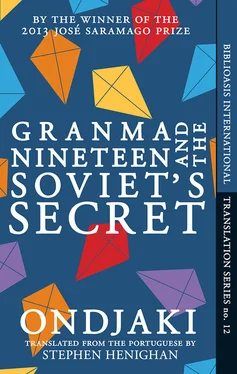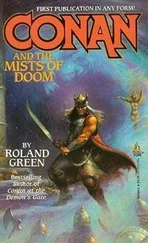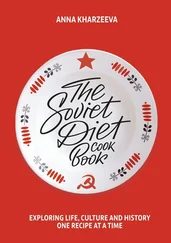Ondjaki
Granma Nineteen and the Soviet's Secret
[…]blue because the dusk may later turn blue, pretending to suspend feelings from golden threads, pretending that today childhood is gilded with toy shops[…]
— Clarice Lispector
“Blue shouts? Never heard of them.”
“They’re words shouted on the ocean floor — kids know about them. Birds, too.”
“And the fish?”
“Fish still don’t know how to shout right. Fish words must be some other colour.”
“Have you ever shouted on the ocean floor?”
“Lots of times. You want to try it?”
The explosion woke up even the birds asleep in the trees and the dozy fish in the sea. Colours came out that had never been seen before: yellow mixed with red pretending to be orange in a bluish green, flares that mimicked the strength of the stars reclining in the sky and a warlike rumbling of the kind made by MiG planes. In the end it was a beautiful explosion that lingered in the noises of the pretty colours that our eyes looked upon and never again forgot.
We, the children, stood looking at the illuminated marvels that filled the sky as though all the rainbows in the world had come running to drink a toast on the ceiling of our dark city of Luanda.
An explosion could be so beautiful, and our open mouths attested to a human silence that came from being close to a rumbling sketched on the heights, where that night the birds learned that the world was a very strange place, what with people of so many nationalities, and that in Luanda anything could happen all at once.
It was on Bishop’s Beach, in the square with the gas station, close to the entrance of the famous construction site of the Mausoleum.
After looking so long at the colours with their soaring sounds in the lighted-up sky, few people noticed that the enormous construction, which the elders said was vertical, tall and in the shape of a big rocket, this construction of so many dusty tasks and a thousand exhausted workers, had started to no longer exist, leaving behind only an ashen dust that took a long time to filter back down to the earth.
All of this happened very close to the house of my Granma Agnette, better known on Bishop’s Beach as Granma Nineteen.
It was in a time the elders call before.
We made drawings in the dirt across from Granma Agnette’s house, then fled from the water trucks that came late in the afternoon to settle the dust.
It was a big square with a gas station in the middle that was on a traffic circle so that trucks and cars could loop around it and pretend that they were in a big city.
The Comrade Gas Jockey was able to sleep away most of his working hours because the pump never had any gasoline. He only woke up when he heard the voice of crazy Sea Foam.
“Those stars that fall all of a sudden have names: they’re fouling stars and that ain’t the weed talking, I know what I says with all these teeth in my mouth…”
On the other side of the gas station was the gigantic construction site of the Mausoleum, a place they were building to hold the body of Comrade President Agostinho Neto, which had spent all these years embalmed by some Soviet experts in the art of keeping a person with an appearance fit to be seen.
Behind the construction site, on the other side of our square where the dust never settled, lay that beautiful thing that taught me about blue every day: the big sea, better known as the ocean.
“You all talk about falling stars, but I know all the dictionaries of the Angolan and Cuban languages. Fouling stars are phenomena of the skies of the dark universe, the cosmic dust and so on… You dipsticks who never went to university schools!”
We, the children, laughed in outbursts so thick we could almost see them sketched in the air. We were struck silent by terror and magic at the words of the comrade lunatic.
“Get this, kids, there are two skies: the blue sky that belongs to our eyes and to the wings of planes and little birds. And then there’s a black sky that’s as big as a desert.”
We were almost not afraid of Sea Foam. He had never done anything bad to anyone.
“Fouling stars melted in the heat of the sun and that’s why they fall towards planet world. Our planet is the only one that has water where they can cool down again. They’re fouling stars, and one day, after cooling off, I swear, those stars are going to want to return home…”
He shrugged his threads and went off with a nervous laugh that could have been a sob, walking ever faster, raising the dust with his bare feet, going forward as if he were about to enter the sea.
“We’re still going to see those stars rise up from the earth to way up there, in the skies that sleep far away dressed in bright brightnesses…”
On our dusty veranda, Granma Catarina, Granma Agnette’s sister, would slowly appear dressed in the black of her old mourning garb, with her white hair like downy cotton.
“Still in mourning, Dona Catarina?” asked the neighbour, Dona Libânia.
“As long as the war in our country continues, sister, all the dead are my children.”
Granma Nhéte watered the plants, the bushes and the trees with the thin trickle of water that appeared on Tuesdays and Thursdays. She watered the guava tree and the fig tree, the cherimoya tree, the palm tree and the mango tree. Afterwards she soaked the steps and watered the flowerpots.
“Children! Everybody inside. It’s snack time.”
Snack time was complicated for us: we had to go and wash our armpits, hands and faces before sitting at the table. We ate half a slice of bread, half a banana and a glass of water.
“Anybody who wants to can make ngonguenha , but only use a little sugar. It’s almost finished.”
Sometimes on the way over we grabbed guavas or mangoes that the bats had forgotten to pillage. A little after five o’clock the Soviets’ water truck would come by to settle the dust in the street and on the sidewalk.
One of the cousins had the job of listening out for noise. The Comrade Gas Jockey would wake up when the Soviet driver hooked up the water truck on the construction site of the Mausoleum. This was the signal. Crazy Sea Foam would appear at his front gate with a tiny whip that he would bob in the wind around his legs.
“Granma Catarina, is it true that Sea Foam has an alligator hidden in the doghouse in his yard?”
“Maybe,” Granma laughed.
“Does an alligator fit in a doghouse?”
“If it’s really small.”
Some of us were frightened by this tale, others laughed nervously as we ate in a hurry to get out into the street again. Granma Agnette wasn’t home. She had gone to a last-minute funeral.
“Here in Luanda people die without giving proper notice. Such bad manners!” Granma Catarina would say.
Swirls of wind lifted the afternoon dust, and the leaves around the Mausoleum square danced in the air without wanting to go very far.
The Comrade Gas Jockey started to close up the gas station, Sea Foam was dancing as though the breeze were a wedding chorus, and many workers, dressed in blue coveralls and yellow construction helmets, were coming out the main gate of the Mausoleum. Men who walked hand-in-hand, laughing, doffing their helmets, drinking a few beers, rubbing their eyes because of the tears conjured up by the dust.
“It must be boring to work,” Pi said. “They’re all happy when it’s time to go home.”
His real name was Pinduca, and in the family he was called Pi. Sea Foam, who had studied mathematics in Cuba until he went crazy, told us that Pi was equal to 3.14. Even without understanding, we liked this name that sounded like numbers and had a decimal point.
Читать дальше












